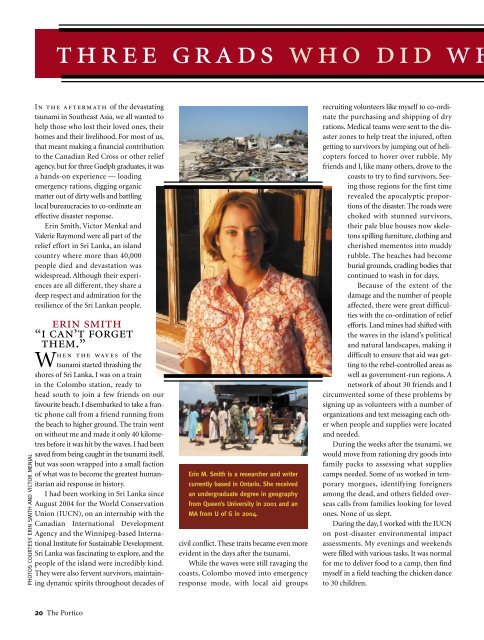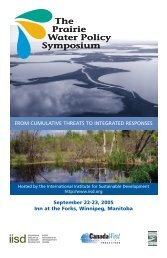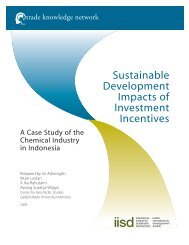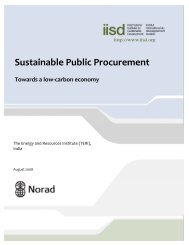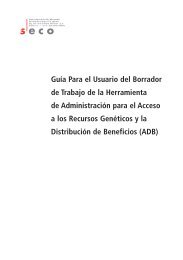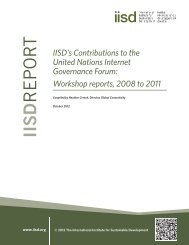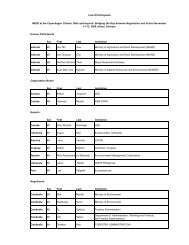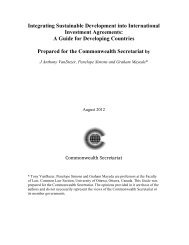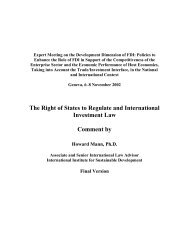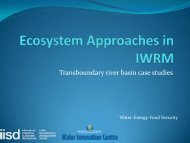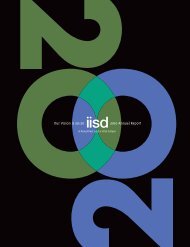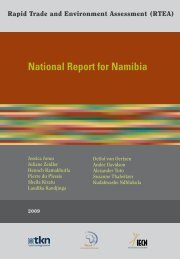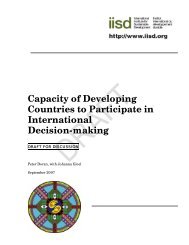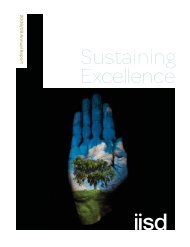Three grads who did what we all wanted to do - International ...
Three grads who did what we all wanted to do - International ...
Three grads who did what we all wanted to do - International ...
Create successful ePaper yourself
Turn your PDF publications into a flip-book with our unique Google optimized e-Paper software.
THREE GRADS WHO DID WH<br />
PHOTOS COURTESY ERIN SMITH AND VICTOR MENJAL<br />
IN THE AFTERMATH of the devastating<br />
tsunami in Southeast Asia, <strong>we</strong> <strong>all</strong> <strong>wanted</strong> <strong>to</strong><br />
help those <strong>who</strong> lost their loved ones, their<br />
homes and their livelihood. For most of us,<br />
that meant making a financial contribution<br />
<strong>to</strong> the Canadian Red Cross or other relief<br />
agency, but for three Guelph graduates, it was<br />
a hands-on experience — loading<br />
emergency rations, digging organic<br />
matter out of dirty <strong>we</strong>lls and battling<br />
local bureaucracies <strong>to</strong> co-ordinate an<br />
effective disaster response.<br />
Erin Smith, Vic<strong>to</strong>r Menkal and<br />
Valerie Raymond <strong>we</strong>re <strong>all</strong> part of the<br />
relief effort in Sri Lanka, an island<br />
country where more than 40,000<br />
people died and devastation was<br />
widespread. Although their experiences<br />
are <strong>all</strong> different, they share a<br />
deep respect and admiration for the<br />
resilience of the Sri Lankan people.<br />
ERIN SMITH<br />
“I CAN’T FORGET<br />
THEM.”<br />
WHEN THE WAVES of the<br />
tsunami started thrashing the<br />
shores of Sri Lanka, I was on a train<br />
in the Colombo station, ready <strong>to</strong><br />
head south <strong>to</strong> join a few friends on our<br />
favourite beach. I disembarked <strong>to</strong> take a frantic<br />
phone c<strong>all</strong> from a friend running from<br />
the beach <strong>to</strong> higher ground. The train <strong>we</strong>nt<br />
on without me and made it only 40 kilometres<br />
before it was hit by the waves. I had been<br />
saved from being caught in the tsunami itself,<br />
but was soon wrapped in<strong>to</strong> a sm<strong>all</strong> faction<br />
of <strong>what</strong> was <strong>to</strong> become the greatest humanitarian<br />
aid response in his<strong>to</strong>ry.<br />
I had been working in Sri Lanka since<br />
August 2004 for the World Conservation<br />
Union (IUCN), on an internship with the<br />
Canadian <strong>International</strong> Development<br />
Agency and the Winnipeg-based <strong>International</strong><br />
Institute for Sustainable Development.<br />
Sri Lanka was fascinating <strong>to</strong> explore, and the<br />
people of the island <strong>we</strong>re incredibly kind.<br />
They <strong>we</strong>re also fervent survivors, maintaining<br />
dynamic spirits throughout decades of<br />
Erin M. Smith is a researcher and writer<br />
currently based in Ontario. She received<br />
an undergraduate degree in geography<br />
from Queen’s University in 2001 and an<br />
MA from U of G in 2004.<br />
civil conflict. These traits became even more<br />
evident in the days after the tsunami.<br />
While the waves <strong>we</strong>re still ravaging the<br />
coasts, Colombo moved in<strong>to</strong> emergency<br />
response mode, with local aid groups<br />
recruiting volunteers like myself <strong>to</strong> co-ordinate<br />
the purchasing and shipping of dry<br />
rations. Medical teams <strong>we</strong>re sent <strong>to</strong> the disaster<br />
zones <strong>to</strong> help treat the injured, often<br />
getting <strong>to</strong> survivors by jumping out of helicopters<br />
forced <strong>to</strong> hover over rubble. My<br />
friends and I, like many others, drove <strong>to</strong> the<br />
coasts <strong>to</strong> try <strong>to</strong> find survivors. Seeing<br />
those regions for the first time<br />
revealed the apocalyptic proportions<br />
of the disaster. The roads <strong>we</strong>re<br />
choked with stunned survivors,<br />
their pale blue houses now skele<strong>to</strong>ns<br />
spilling furniture, clothing and<br />
cherished memen<strong>to</strong>s in<strong>to</strong> muddy<br />
rubble. The beaches had become<br />
burial grounds, cradling bodies that<br />
continued <strong>to</strong> wash in for days.<br />
Because of the extent of the<br />
damage and the number of people<br />
affected, there <strong>we</strong>re great difficulties<br />
with the co-ordination of relief<br />
efforts. Land mines had shifted with<br />
the waves in the island’s political<br />
and natural landscapes, making it<br />
difficult <strong>to</strong> ensure that aid was getting<br />
<strong>to</strong> the rebel-controlled areas as<br />
<strong>we</strong>ll as government-run regions. A<br />
network of about 30 friends and I<br />
circumvented some of these problems by<br />
signing up as volunteers with a number of<br />
organizations and text messaging each other<br />
when people and supplies <strong>we</strong>re located<br />
and needed.<br />
During the <strong>we</strong>eks after the tsunami, <strong>we</strong><br />
would move from rationing dry goods in<strong>to</strong><br />
family packs <strong>to</strong> assessing <strong>what</strong> supplies<br />
camps needed. Some of us worked in temporary<br />
morgues, identifying foreigners<br />
among the dead, and others fielded overseas<br />
c<strong>all</strong>s from families looking for loved<br />
ones. None of us slept.<br />
During the day, I worked with the IUCN<br />
on post-disaster environmental impact<br />
assessments. My evenings and <strong>we</strong>ekends<br />
<strong>we</strong>re filled with various tasks. It was normal<br />
for me <strong>to</strong> deliver food <strong>to</strong> a camp, then find<br />
myself in a field teaching the chicken dance<br />
<strong>to</strong> 30 children.<br />
20 The Portico
AT WE ALL WANTED TO DO<br />
In my last few <strong>we</strong>eks in Sri Lanka, I saw<br />
the need for clothing and medicines replaced<br />
by demands for building materials and sanitation<br />
networks. The kids in the camps<br />
started drawing houses being built instead<br />
of waves in the sky. Most organizations are<br />
now focusing on long-term endeavours such<br />
as livelihoods, housing and sanitation<br />
projects. The initiatives I’m most<br />
hopeful about are the ones being carried<br />
out by sm<strong>all</strong>er grassroots movements<br />
working alongside international<br />
organizations.<br />
The world’s generous response<br />
<strong>to</strong> the victims of the tsunami was<br />
overwhelming but justified. Too<br />
often, many of us <strong>all</strong>ow our desensitized<br />
selves <strong>to</strong> sit back while others<br />
are in need, and now that the initial<br />
response <strong>to</strong> the waves is over,<br />
there is concern that those affected<br />
will be left behind by the rest of the<br />
world. This sentiment was made<br />
clear <strong>to</strong> me in the plea of a woman<br />
my age now living, like hundreds of<br />
thousands across the island, in a<br />
refugee camp. “Please,” she whispered<br />
as she held my shoulder.<br />
“When you <strong>all</strong> leave, <strong>do</strong>n’t forget us.”<br />
There’s no way I ever will.<br />
VICTOR MENKAL<br />
“THE RESILIENCE<br />
OF THE SRI LANKANS<br />
IS INCREDIBLE.”<br />
WITHIN DAYS of the tsunami, I saw<br />
a TV interview with Toron<strong>to</strong> paramedic<br />
Rahul Singh, <strong>who</strong> was standing in<br />
front of a large p<strong>all</strong>et of bottled water being<br />
airlifted <strong>to</strong> Sri Lanka. I contacted him by e-<br />
mail and suggested a sm<strong>all</strong> reverse osmosis<br />
water plant would be much more cost-effective<br />
than shipping water and offered <strong>to</strong> provide<br />
technical support and a <strong>do</strong>nation. I had<br />
intended <strong>to</strong> provide support from Whitehorse,<br />
but he c<strong>all</strong>ed the next day (Dec. 30)<br />
and asked if I would be ready <strong>to</strong> leave Jan. 2.<br />
It <strong>did</strong>n’t take much thought <strong>to</strong> decide <strong>to</strong> go.<br />
I joined a team of volunteer paramedics<br />
Vic<strong>to</strong>r Menkal, B.Sc.(Eng.) ’87, is a water<br />
resources engineer in Whitehorse,<br />
Yukon. He is also a volunteer with the<br />
Canadian Ski Patrol and has experience<br />
as an auxiliary paramedic. He is pictured<br />
here with his Sri Lankin friend Krishan.<br />
with Global Medics, an amazing little nonprofit<br />
aid group that’s been working for a<br />
number of years in Southeast Asia and other<br />
developing countries, providing medical<br />
training, medical supplies, clinics and disaster<br />
assistance.<br />
The Global Medics team was responsible<br />
for setting up a sm<strong>all</strong> clinic and dispensary<br />
at our hotel <strong>to</strong> service local needs, provided<br />
mobile medical assistance <strong>to</strong> refugee camps<br />
and sm<strong>all</strong> villages affected by the tsunami,<br />
and built a clinic at a refugee camp.<br />
My work included an engineering<br />
evaluation of the municipal and<br />
private water supply systems for the<br />
<strong>to</strong>wn of Batticaloa (population over<br />
100,000), developing a <strong>we</strong>ll-decontamination<br />
strategy, and providing<br />
training and advice on required<br />
emergency repairs.<br />
Many days, I was elbow deep in<br />
dirty <strong>we</strong>lls training teams of local<br />
residents and volunteers from the<br />
Texas Baptist Men’s organization on<br />
methods <strong>to</strong> clean <strong>we</strong>lls contaminated<br />
with <strong>to</strong>xic organic sludge left by<br />
the tsunami. Equipment was begged,<br />
borro<strong>we</strong>d or otherwise acquired.<br />
Rahul’s local contacts in Sri Lanka<br />
<strong>we</strong>re invaluable. Krishan Thambapillai,<br />
a young local businessman,<br />
was one of the most resourceful<br />
people I’ve ever met. He organized<br />
volunteers <strong>to</strong> help clean <strong>we</strong>lls, co-ordinated<br />
with his uncle in Colombo <strong>to</strong> get the specialized<br />
pumping equipment, and used other<br />
local businesses <strong>to</strong> provide supplies and<br />
equipment. After working around the clock<br />
for countless days, he still <strong>to</strong>ok the time <strong>to</strong><br />
make a Canadian flag with the “Camp<br />
Yukon” logo for our base camp.<br />
A six-year-old boy named Ajanthan<br />
became my engineering assistant. Every day,<br />
he carried my backpack and rode around<br />
with me. We gave him the nickname “Short<br />
Round” from the Indiana Jones movie.<br />
After mobilizing the <strong>we</strong>ll-decontamination<br />
teams, I evaluated the municipal pipedwater<br />
system. Many of the municipal <strong>we</strong>lls<br />
<strong>we</strong>re infected with E. coli, and pumps,<br />
pipelines and other equipment <strong>we</strong>re in need<br />
of repair. I was sickened <strong>to</strong> find that both<br />
municipal <strong>we</strong>ll fields <strong>we</strong>re also contaminat-<br />
Summer 2005 21
PHOTOS BY VICTOR MENKAL, ERIN SMITH AND NICK WESTOVER, FAC; STORY COURTESY CANADA WORLD VIEW<br />
ed with land mines that had been scattered<br />
from two military bases by the flooding.<br />
Rohul’s contacts came through again,<br />
and a demining outfit of ex-military engineers<br />
from the Indian army came <strong>to</strong> help so<br />
<strong>we</strong> could inspect and clean municipal <strong>we</strong>lls.<br />
We c<strong>all</strong>ed these brave men the Sri Lankan<br />
National Tap Dance Team.<br />
We developed a plan of action <strong>to</strong> undertake<br />
emergency repairs required <strong>to</strong> keep safe<br />
water flowing <strong>to</strong> the <strong>to</strong>wn, hospital, schools<br />
and refugee camps, and set up a<br />
basic water lab for the local engineer<br />
<strong>to</strong> use. Rahul asked me <strong>to</strong> train a<br />
couple of environmental health<br />
inspec<strong>to</strong>rs from the Ministry of<br />
Health in <strong>we</strong>ll inspection and<br />
decontamination. More than 50<br />
people sho<strong>we</strong>d up for my course.<br />
The kindness, generosity and<br />
resilience of the Sri Lankans <strong>we</strong>re<br />
incredible. People greeted us warmly<br />
wherever <strong>we</strong> <strong>we</strong>nt and offered soft<br />
drinks even though they had lost<br />
almost everything.<br />
I am extremely proud <strong>to</strong> have<br />
been able <strong>to</strong> work with Rahul’s<br />
Global Medics team. It was amazing<br />
<strong>to</strong> see the difference that such a<br />
sm<strong>all</strong> group of people can make for<br />
so many others. The experience was<br />
one of the most incredible things I<br />
have ever <strong>do</strong>ne.<br />
I am currently working with the Yukon<br />
government, Yukon College and the Rotary<br />
Club <strong>to</strong> “a<strong>do</strong>pt” the <strong>to</strong>wn of Batticaloa and<br />
provide ongoing assistance for at least one<br />
year. In the meantime, the work of Global<br />
Medics continues in Sri Lanka. If you’d like <strong>to</strong><br />
help, contact the organization at dmgf.org.<br />
VALERIE RAYMOND<br />
“WE HAVE TO TRY<br />
TO MAKE A SMALL<br />
DIFFERENCE.”<br />
ON DEC. 26, Valerie Raymond, BA<br />
’73, Canada’s high commissioner <strong>to</strong><br />
Sri Lanka, like many other Canadians, was<br />
enjoying a few days’ holiday. As fate would<br />
have it, she and her partner <strong>we</strong>re at a resort<br />
near G<strong>all</strong>e on Sri Lanka’s south<strong>we</strong>st coast<br />
and experienced first-hand the tsunami that<br />
so dramatic<strong>all</strong>y affected the island — and<br />
the world — that day.<br />
They watched from their second-s<strong>to</strong>rey<br />
room as the sea eerily receded, then surged<br />
<strong>to</strong> shore. But it wasn’t until the water was<br />
calm once more and she <strong>we</strong>nt <strong>do</strong>wnstairs<br />
Valerie Raymond was born in Winnipeg,<br />
grew up in Edmon<strong>to</strong>n and began her<br />
career as a reporter for the Ottawa Citizen<br />
in the mid-1970s. She moved on<br />
<strong>to</strong> a series of communications positions<br />
in the federal government and, in 1986,<br />
joined the Department of External Affairs<br />
and <strong>International</strong> Trade, where she <strong>to</strong>ok<br />
on a number of senior jobs. She served<br />
as Canada’s high commissioner <strong>to</strong> New<br />
Zealand from 1997 <strong>to</strong> 2001, and in 2002<br />
was posted <strong>to</strong> Sri Lanka with concurrent<br />
accreditation <strong>to</strong> the Maldives.<br />
that Raymond began <strong>to</strong> grasp the devastation<br />
the waves had wrought — the hotel<br />
lobby gutted, shops destroyed, concrete w<strong>all</strong>s<br />
flattened and cars strewn about like <strong>to</strong>ys.<br />
Sri Lanka was hard hit by the tsunami,<br />
with more than 40,000 deaths and vast<br />
stretches of coastal areas ruined. Raymond<br />
found her way back the following day <strong>to</strong> the<br />
inland capital of Colombo, and since then,<br />
her life and job have been consumed by the<br />
disaster.<br />
Initi<strong>all</strong>y, consular matters <strong>to</strong>ok<br />
priority, with those in the High<br />
Commission spending exhausting<br />
days helping <strong>to</strong> account for Canadians<br />
in Sri Lanka, finding them<br />
accommodation, contacting their<br />
families and easing their way home.<br />
She and her staff also worked closely<br />
with officials in Ottawa on Canada’s<br />
humanitarian response <strong>to</strong> the<br />
tsunami, a key part of which was<br />
bringing the 200-member Disaster<br />
Assistance Response Team <strong>to</strong> provide<br />
medical support, clean water<br />
and other assistance <strong>to</strong> the island’s<br />
devastated Ampara district.<br />
Raymond lauds the dedication<br />
and professionalism of staff at the<br />
Canadian mission in Sri Lanka, as<br />
<strong>we</strong>ll as the temporary reinforcements<br />
sent by Foreign Affairs<br />
Canada. She says she’s been<br />
inspired by the resilience of the Sri Lankan<br />
people, <strong>who</strong>m she has come <strong>to</strong> know <strong>we</strong>ll<br />
through Canada’s efforts in support of<br />
ending the country’s long-standing and<br />
brutal civil war.<br />
The conflict zone in the northeast was<br />
badly hit by the waves, she says. “Many of<br />
these people had suffered for many years<br />
before the tsunami and now have <strong>to</strong> face<br />
another disaster. The devastation and the<br />
destruction are absolutely heartbreaking.”<br />
Yet, she adds, there have been heartening<br />
s<strong>to</strong>ries of people from the country’s three<br />
main groups — the Sinhalese, the Tamils<br />
and the Muslims — helping each other.<br />
Raymond will return <strong>to</strong> Ottawa when<br />
her three-year appointment <strong>to</strong> Colombo<br />
ends this summer, but life after the tsunami<br />
won’t ever be the same.<br />
“I <strong>do</strong>n’t think <strong>we</strong> can try <strong>to</strong> understand<br />
these things. We simply have <strong>to</strong> try <strong>to</strong> make a<br />
sm<strong>all</strong> difference, and that’s very sustaining.” ■<br />
22 The Portico


